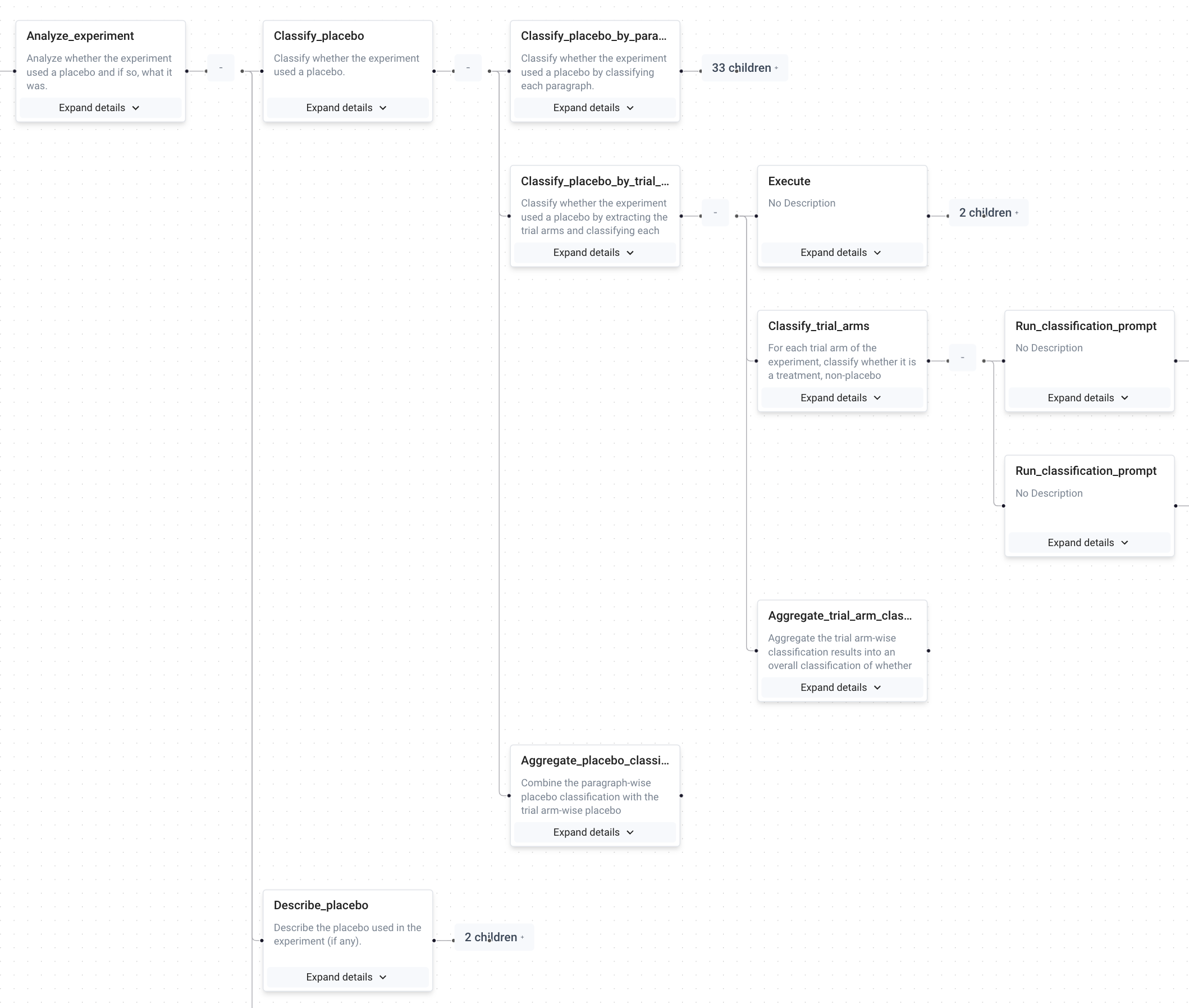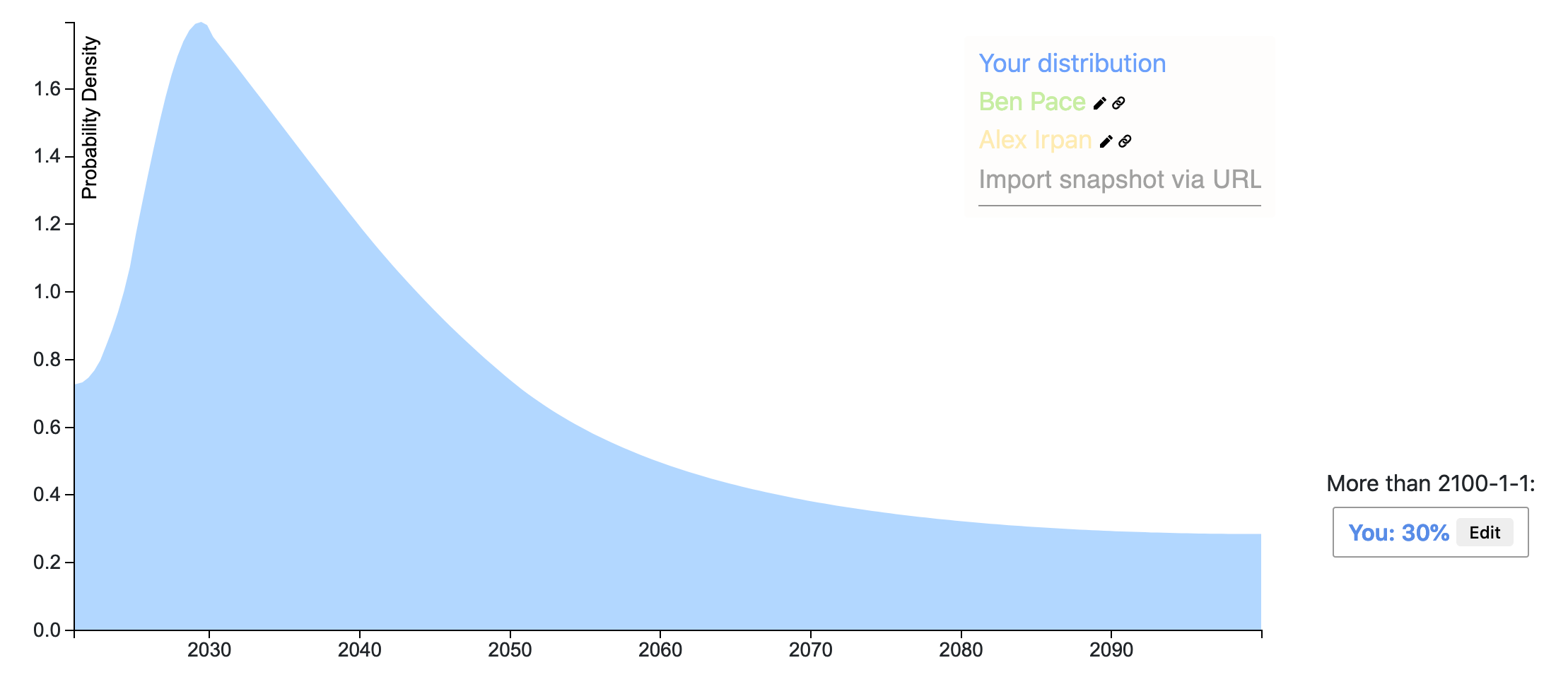ceo @ ought
Posts
Wikitag Contributions
Meta: Unreflected rants (intentionally) state a one-sided, probably somewhat mistaken position. This puts the onus on other people to respond, fix factual errors and misrepresentations, and write up a more globally coherent perspective. Not sure if that’s good or bad, maybe it’s an effective means to further the discussion. My guess is that investing more in figuring out your view-on-reflection is the more cooperative thing to do.
I strongly agree that this is a promising direction. It's similar to the bet on supervising process we're making at Ought.
In the terminology of this post, our focus is on creating externalized reasoners that are
- authentic (reasoning is legible, complete, and causally responsible for the conclusions) and
- competitive (results are as good or better than results by end-to-end systems).
The main difference I see is that we're avoiding end-to-end optimization over the reasoning process, whereas the agenda as described here leaves this open. More specifically, we're aiming for authenticity through factored cognition—breaking down reasoning into individual steps that don't share the larger context—because:
- it's a way to enforce completeness and causal responsibility,
- it scales to more complex tasks than append-only chain-of-thought style reasoning
Developing tools to automate the oversight of externalized reasoning.
Do you have more thoughts on what would be good to build here?
We've recently started making developer tools for our own use as we debug and oversee compositional reasoning. For example, we're recording function calls that correspond to substeps of reasoning so that we can zoom in on steps and see what the inputs and outputs looked like, and where things went wrong. Applied to a decomposition for the task "Did this paper use a placebo? If so, what was it?":

And, lest you wonder what sort of single correlated already-known-to-me variable could make my whole argument and confidence come crashing down around me, it's whether humanity's going to rapidly become much more competent about AGI than it appears to be about everything else.
I conclude from this that we should push on making humanity more competent at everything that affects AGI outcomes, including policy, development, deployment, and coordination. In other times I'd think that's pretty much impossible, but on my model of how AI goes our ability to increase our competence at reasoning, evidence, argumentation, and planning is sufficiently correlated with getting closer to AGI that it's only very hard.
I imagine you think that this is basically impossible, i.e. not worth intervening on. Does that seem right?
If so, I'd guess your reasons are something like this:
- Any system that can make a big difference in these domains is extremely dangerous because it would need to be better than us at planning, and danger is a function of competent plans. Can't find a reference but it was discussed in one of the 2021 MIRI conversations.
- The coordination problem is too hard. Even if some actors have better epistemics it won't be enough. Eliezer states this position in AGI ruin:
weaksauce Overton-abiding stuff about 'improving public epistemology by setting GPT-4 loose on Twitter to provide scientifically literate arguments about everything' will be cool but will not actually prevent Facebook AI Research from destroying the world six months later, or some eager open-source collaborative from destroying the world a year later if you manage to stop FAIR specifically.
Does that sound right? Are there other important reasons?
Thanks everyone for the submissions! William and I are reviewing them over the next week. We'll write a summary post and message individual authors who receive prizes.
Thanks for the long list of research questions!
On the caffeine/longevity question => would ought be able to factorize variables used in causal modeling? (eg figure out that caffeine is a mTOR+phosphodiesterase inhibitor and then factorize caffeine's effects on longevity through mTOR/phosphodiesterase)? This could be used to make estimates for drugs even if there are no direct studies on the relationship between {drug, longevity}
Yes - causal reasoning is a clear case where decomposition seems promising. For example:
How does X affect Y?
- What's a Z on the causal path between X and Y, screening off Y from X?
- What is X's effect on Z?
- What is Z's effect on Y?
- Based on the answers to 2 & 3, what is X's effect on Y?
We'd need to be careful about all the usual ways causal reasoning can go wrong by ignoring confounders etc
Yeah, getting good at faithfulness is still an open problem. So far, we've mostly relied on imitative finetuning. to get misrepresentations down to about 10% (which is obviously still unacceptable). Going forward, I think that some combination of the following techniques will be needed to get performance to a reasonable level:
- Finetuning + RL from human preferences
- Adversarial data generation for finetuning + RL
- Verifier models, relying on evaluation being easier than generation
- Decomposition of verification, generating and testing ways that a claim could be wrong
- Debate ("self-criticism")
- User feedback, highlighting situations where the model is wrong
- Tracking supporting information for each statement and through each chain of reasoning
- Voting among models trained/finetuned on different datasets
Thanks for the pointer to Pagnoni et al.
Ought co-founder here. Seems worth clarifying how Elicit relates to alignment (cross-posted from EA forum):
1 - Elicit informs how to train powerful AI through decomposition
Roughly speaking, there are two ways of training AI systems:
- End-to-end training
- Decomposition of tasks into human-understandable subtasks
We think decomposition may be a safer way to train powerful AI if it can scale as well as end-to-end training.
Elicit is our bet on the compositional approach. We’re testing how feasible it is to decompose large tasks like “figure out the answer to this science question by reading the literature” by breaking them into subtasks like:
- Brainstorm subquestions that inform the overall question
- Find the most relevant papers for a (sub-)question
- Answer a (sub-)question given an abstract for a paper
- Summarize answers into a single answer
Over time, more of this decomposition will be done by AI assistants.
At each point in time, we want to push the compositional approach to the limits of current language models, and keep up with (or exceed) what’s possible through end-to-end training. This requires that we overcome engineering barriers in gathering human feedback and orchestrating calls to models in a way that doesn’t depend much on current architectures.
I view this as the natural continuation of our past work where we studied decomposition using human participants. Unlike then, it’s now possible to do this work using language models, and the more applied setting has helped us a lot in reducing the gap between research assumptions and deployment.
2 - Elicit makes AI differentially useful for AI & tech policy, and other high-impact applications
In a world where AI capabilities scale rapidly, I think it’s important that these capabilities can support research aimed at guiding AI development and policy, and more generally help us figure out what’s true and make good plans as much as they help persuade and optimize goals with fast feedback or easy specification.
Ajeya mentions this point in The case for aligning narrowly superhuman models:
"Better AI situation in the run-up to superintelligence: If at each stage of ML capabilities progress we have made sure to realize models’ full potential to be helpful to us in fuzzy domains, we will be going into the next stage with maximally-capable assistants to help us navigate a potentially increasingly crazy world. We’ll be more likely to get trustworthy forecasts, policy advice, research assistance, and so on from our AI assistants. Medium-term AI challenges like supercharged fake news / clickbait or AI embezzlement seem like they would be less severe. People who are pursuing more easily-measurable goals like clicks or money seem like they would have less of an advantage over people pursuing hard-to-measure goals like scientific research (including AI alignment research itself). All this seems like it would make the world safer on the eve of transformative AI or AGI, and give humans more powerful and reliable tools for dealing with the TAI / AGI transition."
Beth mentions the more general point in Risks from AI persuasion under possible interventions:
“Instead, try to advance applications of AI that help people understand the world, and advance the development of truthful and genuinely trustworthy AI. For example, support API customers like Ought who are working on products with these goals, and support projects inside OpenAI to improve model truthfulness.”

The video from the factored cognition lab meeting is up:
Description:
Outline:
The Q&A had lots of good questions.